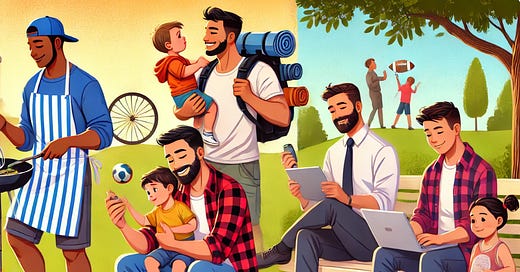Beyond Stereotypes: The Case for New Fatherhood Archetypes
Dads Are More Than Just “Coaches” or “Providers” — Let’s Add the Nuance Fatherhood Deserves
I was attending a traditional wedding with my family and my then 90-year-old grandmother when she suddenly pulled me aside and rather loudly exclaimed, “Jeff, the groom is gay.” I stared at her in the way anyone with aging relatives does when ridiculous remarks reach their ears. “He’s not gay Grandma, he’s just a modern man.” I explained how men like us cry and share feelings and even laser our back hair. “No, he’s definitely gay.” I threw up my hands.
I wasn’t going to win an argument with a woman born before the Great Depression. But the dissonance she identified was there. The woman walking down the aisle was a powerhouse - she was brilliant and career driven. Her soon to be husband was family-focused with dreams of parenting a big family.
We need more dad archetypes. It was obvious.
The Archetypes of Today
Ambitious Dad Tom Critchlow stated it plainly, “The only role model of an active dad is a school coach. What other kinds of dad archetypes are out there?” I quite agree. In fact, the archetypes that dominate our commercials, TV and movies may seem a bit broader, but are still far from useful in trying to model and support modern families that have fathers with the goals Ambitious Dads have today. Here are the 5 most common archetypes in the media today:
The Clueless/Comedic Dad - This dad is often bumbling, slightly clueless, and the source of easy laughs, especially when it comes to household tasks or parenting. Think of sitcom dads like Phil Dunphy from Modern Family or Homer Simpson from The Simpsons.
The Workaholic/Provider-Focused Dad - Frequently seen in dramas, this dad prioritizes work over family, missing enough life moments to create tensions and strained relationships as a result. He might be a business executive, doctor, or police officer, illustrating the “provider” role that distances him from his family emotionally.
The Super Dad - This dad succeeds at everything: career, kids, marriage, hobbies, health and more. While this archetype is positive and aspirational, we also know how difficult it feels to achieve. We want to be super dads… with the time and patience to be present for every game, recital, and family dinner, while still excelling at work. But tradeoffs confront us every single day.
The Sensitive/New Age Dad - This dad is in touch with his emotions, open to talking about his feelings, and actively rejects the “stoic” stereotype of masculinity. He embraces equality in the home, champions his kids’ independence, and is often depicted as the progressive partner.
The “Mr. Mom” / Stay-at-Home Dad - With shifting gender roles, the stay-at-home dad is seen more frequently, both in comedic and realistic portrayals. This dad manages the home, runs errands, and takes on the primary caregiver role while sometimes dealing with social stigma or self-doubt.
None of these archetypes are mutually exclusive. In fact, we can probably see a little of each one in who we are or aspire to be. Part of power of highlighting archetypes is that we can fall into any or all of them rather easily because cultural expectations are low, and we are what we practice (or default into).
Why is this important?
Having a more realistic portrayal of dad archetypes in media shapes how society views fathers, impacts how we see ourselves, and affects how our families define the role of fathers in our households. When we are depicted in nuanced ways—showing both strengths and vulnerabilities—it validates the diversity of fatherhood experiences and encourages fathers and their partners together to redefine expectations about parenting and better address roles (and role modeling) in an intentional way.
How Can We Affect Change?
We need to change the narrative in media and entertainment. This includes social media, not just movie scripts and commercials. But most importantly, we need to encourage dads to share their stories. When fathers openly share their own experiences, they contribute to a larger narrative that values vulnerability and honesty in fatherhood. Social media, blogs, and parenting groups are great platforms for dads to share their journeys, struggles, and learnings. Personal stories about handling work-life balance, dealing with parenting anxieties, or creating family routines add to a culture that celebrates real, engaged fatherhood.





Sounds like an Ambitious Dad vision (in the best of ways) to me! And I love teaching entrepreneurship to my kids while going thru it myself. It’s a fun way to teach resilience (to say the least!)
Yes to more happy fathers that are happy to dote on their kids and spend all their time being present for them. Unfortunately, maybe due to overcorrection, media portrays dads so often as divorced deadbeats..
I'd love to see a new stereotype of dads in their 40's catching a 2nd wind and becoming successful entrepreneurs as their kids are growing up and becoming more independent. It's still a tick for health marriage, tick for raising kids and tick for dads having a chance at continuing to chase their dreams.